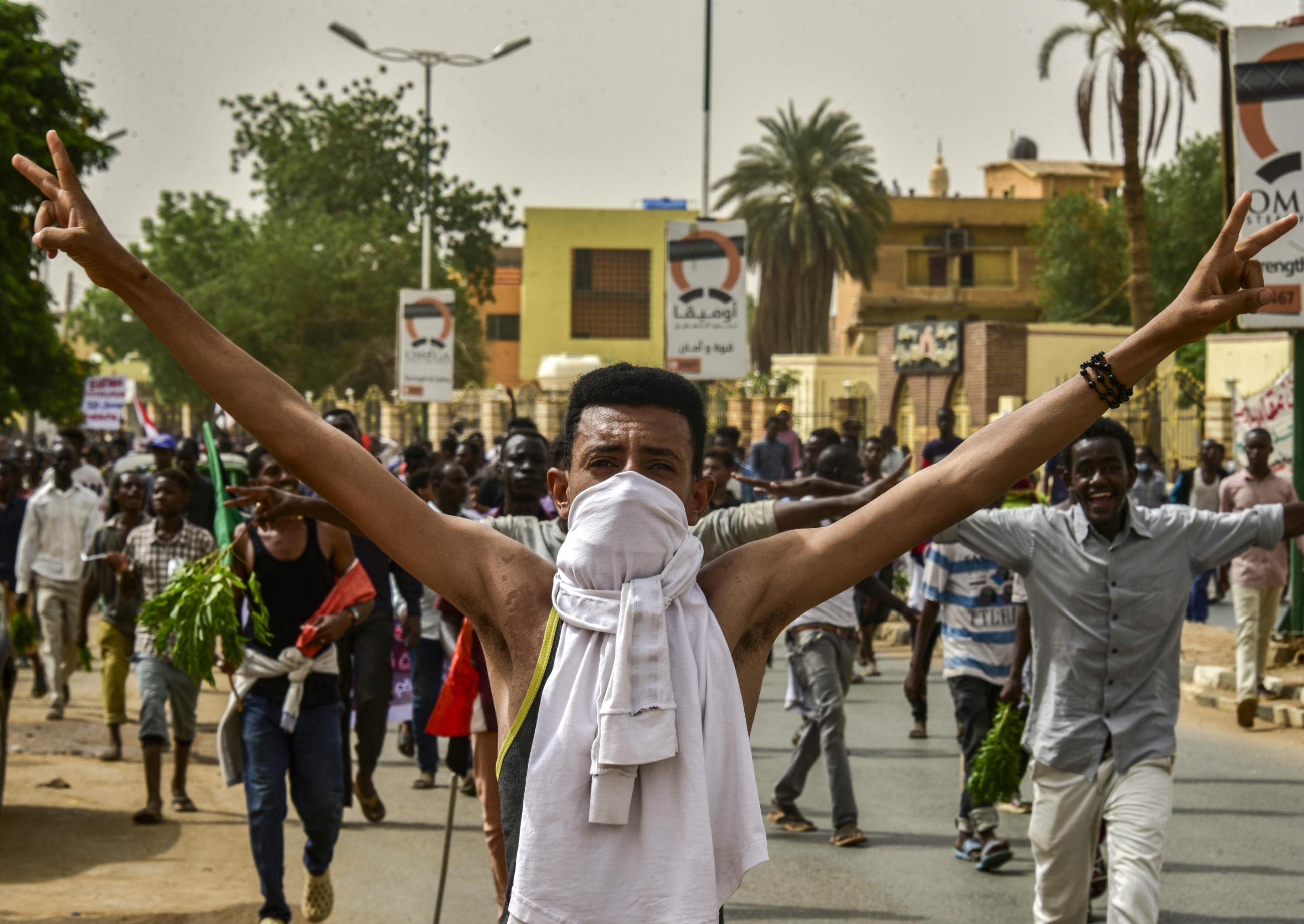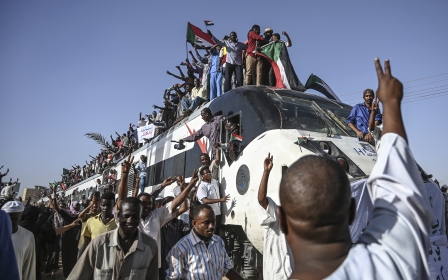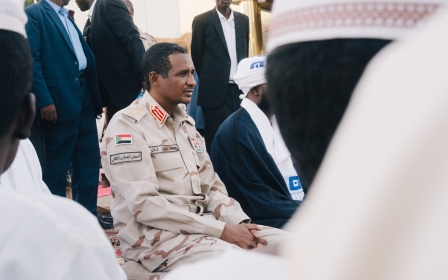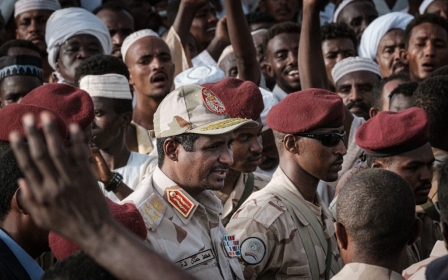Seven killed and scores injured as Sudanese rally for 'march of millions'

Seven people were killed on Sunday during mass demonstrations that rocked Sudan as tens of thousands of people protested against the ruling generals, the official SUNA news agency reported.
The country’s ruling military council had warned on Saturday against a “million-person march” calling for a civilian government, claiming the opposition would be responsible for any deaths.
Despite the threat of violence, protesters from around Sudan converged in the capital Khartoum for the rally, less than a month after a deadly military crackdown on protesters.
SUNA, quoting a health ministry official, said "seven were killed" in the protests, without elaborating how they died or who they were.
New MEE newsletter: Jerusalem Dispatch
Sign up to get the latest insights and analysis on Israel-Palestine, alongside Turkey Unpacked and other MEE newsletters
It said that another 181 people were wounded, including 27 with bullets.
Separately, 10 members of regular forces were also wounded, including three from the feared paramilitary Rapid Support Forces (RSF) shot by "live ammunition", it said.
Earlier, a doctor's group linked to the opposition said at least five protesters were killed and dozens injured during demonstrations in several cities.
"The death of four martyrs in the city of Omdurman on the road of our victorious revolution brings the number of martyrs to five" in Sunday's protests, the committee said, after it reported earlier that a protester was shot dead in the town of Atbara.
"There are several seriously wounded by the bullets of the military council militias in hospitals of the capital and the provinces," AFP quoted a statement from the doctors as saying.
In a speech on Sunday, Mohamed Hamdan Dagolo, also known as Hemeti, the vice president of the Transitional Military Council (TMC), alleged that snipers were among the protesters and that they had injured at least three members of armed forces and several civilians.
Demonstrators have dismissed Hemeti's claims, arguing that the TMC had previously made similar accusations to justify a deadly crackdown on peaceful protests.
Translation: Khartoum rises up. Video shows protesters chanting "freedom, freedom".
Witnesses told AFP news agency that Sudanese forces used tear gas against demonstrators in the Khartoum districts of Bari, Mamura and Arkweit, as well as in the eastern town of Gadaref, as protesters chanted "Civilian rule! Civilian rule!".
The Sudanese Professionals Association (SPA), which has spearheaded protests since December, called on Sunday for protesters in Khartoum to converge on the presidential palace at the centre of the capital.
In Nyala, the capital of the state of South Darfur in southwest Sudan, witnesses reported that the RSF paramilitary group was violently repressing protests there.
Observers also reported that armed forces had opened fire at crowds in el-Obeid in the state of North Kordofan; Kadugli in South Kordofan; and Kassala, the capital of the state of Kassala.
The demonstrations mark a resurgence in street protests that had been quelled by the crackdown and could force a decisive showdown between protesters and the military council, despite ongoing joint African Union (AU) and Ethiopian mediation efforts to bridge the gap between the two sides.
A Sudanese military official told Middle East Eye, on condition of anonymity, that government forces were planning to disperse Sunday’s march, the largest since a two-month sit-in outside the military headquarters was dispersed on 3 June.
The military official said the RSF - blamed for the crackdown that killed at least 128 people in June, according to doctors - as well as the army and police will be deployed on the streets of Khartoum on Saturday night.
“The military council has no path other than going further with the use of violence regarding these protests of 30 June and they have actually begun preparing for that, actually.”
The official said they may attempt to avoid using the levels of violence seen earlier in the month, when bodies were allegedly dumped in the Nile and women were raped at the sit-in, but they have been ordered to prevent a sit-in anywhere in the city.
The official said members of the police may resist orders to use violence on the protesters but that could also lead to the RSF, who have a reputation for extreme violence, behaving more aggressively.
Adapting from experience
The opposition vowed to press on with its plans for the nationwide protest on Sunday - the 30th anniversary of the coup that brought former president Omar al-Bashir to power.
Bashir was ousted in April as a result of months of protests but the military council that replaced him was also rejected by protesters, who have demanded civilian rule.
The SPA called on its supporters to commemorate the protesters killed during the uprising.
Leading SPA member Medani Abas told MEE that they have called on the military to not use violence against the protesters.
“Despite the [military’s] internet shutdown and the ongoing hunting down of activists and protest leaders in the streets of Khartoum, we could reach the people by organising community meetings to address the people in their neighbourhoods,” Abas said, describing how the SPA have rallied support for the protests despite mounting challenges.
He said neighbourhood resistance committees have been vital to communicating with communities because of the internet blackout imposed by the military since 3 June.
One such resistance committee leader, who did not want to be named, said the internet blackout had forced them to meet in person to prepare for the next round of protests.
“We gained a lot of experience from the last six months and we will surprise the government forces with different tactics and tricks,” they said.
Doctors have also been preparing for the protests, setting up field clinics and emergency medical supplies to handle injuries.
“We deployed hundreds of doctors with mobile clinics and small field centres to quickly deal with any emergencies if any violence takes place,” a medical source told MEE. “We have quickly gained a lot of experience in the recent period and we are ready for any scenario.”
Mediation
The military council on Friday indicated that it could return to talks with the opposition after tentatively approving a consolidated AU-Ethiopian proposal, having previously rejected an Ethiopian initiative.
"A number of points have emerged around it, but in general it is a suitable proposal for negotiations to reach a final agreement leading to the establishment of the institutions of a transitional rule," military council spokesman Lieutenant General Shams El Din Kabbashi said.
The Ethiopian proposal had already been approved by the opposition Forces for Freedom and Change (FFC) coalition.
A draft seen by MEE proposed a transitional joint “sovereign council” of 14 members split evenly between military and civilian members with the addition of another independent civilian member to be selected through mutual agreement.
The US, UK and Norway released a joint statement on Saturday saying it supported the mediation efforts and called on the military to avoid the use of violence against protesters.
Sudanese political analyst Salah Aldoma said the coming wave of protests is critical because recent violence has completely collapsed any trust in the military council.
The political science professor at Omdurman Islamic University said the military has been given warnings from the international community to avoid violence but that the FFC is also under pressure to show its leadership.
“The two sides are on the edge of confrontation and to be clear, the whole country is at a crossroads.”
Middle East Eye delivers independent and unrivalled coverage and analysis of the Middle East, North Africa and beyond. To learn more about republishing this content and the associated fees, please fill out this form. More about MEE can be found here.




